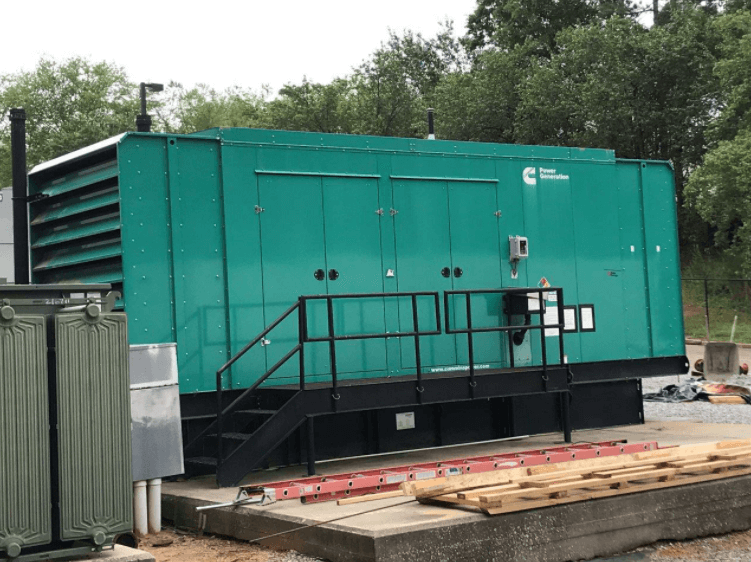The Need For Winterizing Your Backup Diesel Generator & How To Do It.

Starting a generator during the winter season can sometimes feel like a lottery, especially when the poor machine has been set aside for a number of months, only to be asked to jump straight into the action without any prior warm-ups. A backup generator, or any machine for that matter, works similar to the human body in that its well-being is very much contingent upon the care it is subjected to, and hence, this is where the need for “generator winterizing” takes the center stage.
If you live in a remote location with little resources and no immediate help around, then a backup Genset presumes a highly crucial role in your everyday survival. Also, the electric grid in these areas is far from being reliable, and that is assuming it is installed there in the first place. So, a backup generator might be your last resort against a crisis and this is why in the winters, it becomes mighty important to get it prepared for the upcoming challenge.
It’s mostly during the chilly months that the Genset might suffer from starting issues, along with other complications that may directly arise from owner negligence. All the reliable stats point to the dangerous realization that power outages are on the rise, so the role that backup power tools play in our households is only going to increase. Hence, this is why if you fail to winterize your diesel Genset, you are also putting the peace of mind of everyone around you at risk. To prevent that, here we are listing several methods to prepare your Genset for the upcoming frostbites but before that, let’s summarize the impact of doing so through the perception of the owner.
# Need For Winterize Your Diesel Generator?
As we alluded to earlier, for diesel gensets operating in chilly cold areas, a stumbling block often faced by owners is that their model refuses to start in the first place. This is especially common with small-sized portable generators, that are not meant to operate under high load conditions and can only work so well within a bracket of acceptable temperature scales.
Without properly winterizing your diesel generators, you are at best putting your genset’s longevity to risk, and at worst, risking the machine’s ability to start at all when desperate times arrive.
# 5 Tips On How to Winterize Your Diesel Generators:-
1. Condition The Fuel Based On Operating Temperature:
Sometimes in cold weather, even if your diesel generator is kept at its optimum, the same level of care and thought isn’t put to the handling of the diesel fuel. When the temperature drops below the freezing limits, the overall efficiency of diesel fuel is significantly affected, which can further bring starting problems for your genset.
Hence it’s vital that you condition your diesel fuel as per the cold weather, and to do so, you must make use of a fuel stabilizer. As the name indicates, a fuel stabilizer is a device that will prevent the quality of the fuel from deteriorating. When the diesel fuel is kept at its best, the same level of performance can be expected from the machine. Also, you can further install a diesel conditioner that can help the fuel retain its regular properties by preventing the fuel from freezing (or even heating).
2. Importance of an Engine Block Heater:
Utilizing an engine/ motor block heater can likewise enable your backup generator to deal with the cold and run effectively. A motor square warmer will warm the motor oil to an ideal temperature for proper starting. A warming coolant, which is an electrical radiator, can keep up the coolant temperature for a hassle-free starting. Simply ensure you counsel the generator manufacturer’s suggestions before utilizing any sort of heating gadget to affirm it is consistent with your generator/motor.
Further, generator battery, when not fully charged can certainly introduce starting issues, so make sure to check your battery and that it is sufficiently charged, and if that’s not the case, make sure you replace it with a new one.
3. Professional Installation & Handling:
The way where your diesel generator is put away when not in use can likewise have a tremendous effect when it does start. For example, in the event that you just place the machine a couple of feet over the ground, as opposed to keeping it in direct contact with the freezing ground can be a distinction between a generator starting trouble-free and a generator that reacts with dead silence when revved up.
Similar remains true for the diesel fuel that you buy, If say the need to begin your genset is rare, the savvy wager is to just keep the fuel put away in explicitly produced diesel stockpiling tanks, as opposed to customary plastic compartments.
4. Rev Up The Genset From Time To Time:
Even when you’re fortunate enough to not suffer from a spontaneous power outage, it’s still smart to prepare your generator for the time of action by keeping it running every once in a while (preferably, 15 minutes on average every week).
That way, you can not only keep the lubricating oil circulating throughout the internal parts of the diesel engine but also get to discover any major wear and tear well ahead of time. Not just that, keeping the engine running will prevent it from turning into a cozy pest-house and also removes excess dirt, dust, and coagulates.
5. Install Fuel Lines For Fresh Fuel Injection:
Even when you manage to store your diesel fuel perfectly well, the whole effort can go to waste if that fuel inside the engine is too cool which can get mixed with the freshly injected fuel and further deteriorate its quality and viscosity index, which can be quite noxious for the genset’s overall life.
Diesel fuel with higher viscosity can as a result gel with the internal surface of the engine and that can cause poor combustion and damage to the machinery. Fuel Lines are again pretty helpful in terms of keeping your fuel quality at its peak. By heating the fuel to adequate proportions and thereby prevent gelling inside diesel generators








